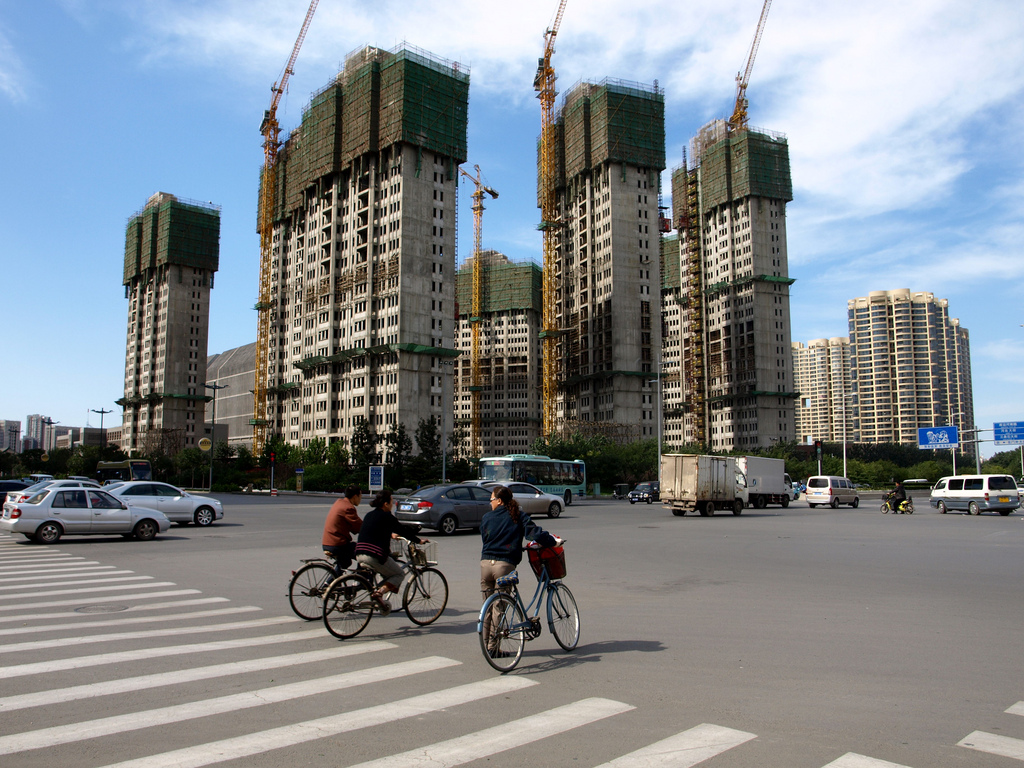
Booming China—and its perils and possibilities—has become a genre all its own in the 21st century. Economists write books about the country’s dragon economy. Environmentalists warn of China’s growing need for water and oil. Political scientists predict a new world order. Meanwhile, the U.S. recession drags on, and pundits on all sides and with all manners of expertise decry America’s falling fortune. But is it inevitable that these nations’ trajectories resemble a seesaw: If one goes up, must the other go down? In advance of the Zócalo event “Is China Destined to Rule the World?”, we asked careful observers of China to give us their single most powerful argument against the narrative of China’s rise and America’s decline.

If what you care about is relative share of global exports and imports and absolute economic output, China is on the ascendant: It’s already the largest trading nation and will have the largest GDP by the end of the decade at the latest. But the question remains: Why would average Americans care about that?
Quality of life in the U.S. is at best distantly related to international trade and GDP. We’re better off measuring the values that are core to America’s identity: life, liberty, and the pursuit of happiness. It’s true that life expectancy is rising in China: Its 76-year average is only three years behind the U.S., according to the World Health Organization. But when it comes to liberty, people in China are denied the vote, minorities in the East are denied independence, and rural people in particular are denied the right to live where they want. The right to freedom of speech or of assembly and the right to fair trial all remain routinely abused. And in a survey that asks respondents to rank their satisfaction with life on a scale of one to 10, the average answer in China is around five, and the U.S. is around seven. So China has a lot of catching up to do if it is to equal America’s quality of life.
And while it is true that China is making immense strides in terms of income, health, and education, that’s good news for everyone. A healthier, wealthier China should make for happier people there, but also for increased opportunities for bilateral trade, investment, and migration flows with the U.S. So perhaps the most powerful argument against the narrative of ascendance and decline is that we aren’t in a zero-sum game. What is good for China is good for the U.S.—and vice versa.
Charles Kenny is a senior fellow at the Center for Global Development and author of The Upside of Down: Why the Rise of the Rest is Great for the West (Basic Books).

There is no competition between these countries. Yes, China is ascendant, but so is the United States. Both have economies that are expanding—the United States’ at a slower rate, but from a much larger base. And although China’s military is growing, the United States maintains a commanding lead. The real issue is whether China brings the whole package to the table. Is it positioning itself to be a great power on par with the United States? Does it possess a vision and set of political values that are compelling both to its own people and to those outside its borders? Here is where China falls woefully short—it is a descending, rather than ascending, polity.
Just one year into its tenure, China’s new leadership is putting its own distinctive stamp on the country’s political and social world. It is a world that devalues independence of thought and action. The country’s leaders are cracking down on the Internet, arresting social activists, and limiting opportunities for political participation. In the process, they are limiting their opportunities to address China’s myriad social problems effectively and undermining any hope of establishing a creative and innovative society that others will want to join. As a result, those who can afford to leave the country are doing so. In a 2013 survey of Chinese with personal wealth of at least $1.6 million, 64 percent stated that they planned to emigrate, and one-third has already done so. The reasons are not complicated. They want a cleaner environment, better healthcare, protection of their assets, and access to better education for their children. Their number-one destination is the United States.
Far from developing into a global power that others want to emulate, China is transforming into a power that many of its own most talented people want to leave. A 1958 song by The Genies asks the most important question: “Who’s that knocking at my door?” For China, the answer, at least for now, is no one.
Elizabeth Economy is the C.V. Starr senior fellow and director for Asia studies at the Council on Foreign Relations. Her most recent book (co-authored with Michael Levi) is By All Means Necessary: How China’s Resource Quest is Changing the World.

America has always ascended, and I do not see that changing. It goes through down cycles of course—the Depression, the recent recession, Jimmy Carter’s “malaise” era, etc.—but it has always bounced back. Past history is no guarantee of future performance, but it is the best predictor we have.
China’s rise comes largely thanks to its ultra-low costs—in labor, in taxes, and in rents, for example—but as these costs continue rising, it will need to become an innovation economy to maintain an upward economic trajectory.
But I do not see China’s continued ascension because I do not see China becoming an innovation economy. Here’s what will hold China back:
– Weak protection of intellectual property. Why innovate when you can copy?
– An education system that rewards rote learning over critical thinking.
– Low numbers of immigrants and a lack of diversity. U.S. innovation comes from people born here as well as people who come here from other countries. Not only does the U.S. get so many of the best and brightest from elsewhere; having a cultural mix within companies creates strength. China lacks any easy mechanism that would allow foreigners to reside there permanently and, more importantly, foreigners are not well accepted in the Chinese workplace.
– Privileged state-owned companies have it way easier than small private companies. China’s big state-owned entities receive both direct governmental subsidies and countless indirect subsidies. Innovation comes from both the bottom-up and the top-down. I do not see China generating much bottom-up innovation.
Dan Harris is a founding member of Harris Moure, an international law firm with lawyers in Seattle, Beijing, and Qingdao. He is also a co-editor of the China Law Blog.

One way to approach the question of who’s in decline and who’s in ascendance is to assess each country’s use of the human resources potentially at its disposal. Among the many aspects of this approach that merit consideration, I highlight three, framing a line of inquiry and allowing readers to bring their own sense of the evidence to bear in arriving at a conclusion.
First, which country provides greater opportunity to its ethnic and racial minorities to contribute to society? Are minorities more likely to be imprisoned, or disappeared, or self-immolating? Can they achieve positions of influence in government, or in business, or in the arts?
Second, which country offers a greater draw for bright and ambitious people from around the world? Which does a better job of assimilating the foreign born who arrive on its shores and facilitating their productive participation in society?
Third, which country is performing better in educating the broad masses of its young people? In which are entrants to the labor force better equipped with the skills, the discipline, and the creativity they will need for gainful employment over the course of a lifetime?
The U.S. shows much room for improvement in all three of these dimensions. To the extent that it is performing better than China, that may not set the bar high enough. Performing better than China does not mean the U.S. is performing as well as it should be.
Calla Wiemer is a consultant on the Chinese economy and a visiting scholar at the U.S.-China Institute of the University of Southern California. She is writing a textbook titled Macroeconomics for Emerging East Asia.



